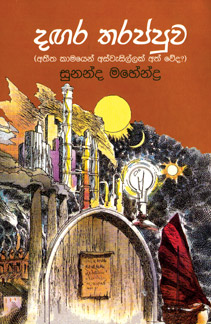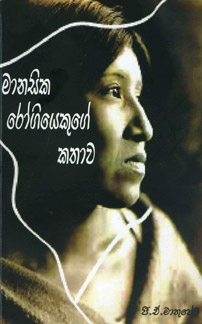Book Review
Wider canvass of relationships
Title : Dangara Tarappuva (Spiral Staircase)
Author : Sunanda Mahendra
Genre : Novel
Publishers : Dayawansa Jayakody
Price : Rs 280
Just back from abroad after his studies, a young anthropologist tries
to plan his future course of action. In this exercise he meets a girl
student in the university, whose ‘round face, thin fingers and hair
parted in the middle’ remind him of his dead aunt, mother’s sister, with
whom he had almost an Oedipus-like relationship. He spends his time
singing with her and listening to her melodious but mournful tone of
voice while kissing her neck and cheeks. And at other times he seeks
voyeuristic enjoyment watching her bathing her daughter at the well.
 But this story Dangara Tarappuva (Spiral Staircase) is not only on
that relationship; it covers a wider canvass and is a narrative of the
trials and tribulations of middle class families of several decades ago.
But the novelist makes it a general commentary on the middle class and
life as we live it. The Spiral Staircase, to my mind, is symbolic. The
narrator records ‘we were going up the staircase and coming down all the
time’. His relationship with his cousin sister grows around it. Was
their life like that? Was it monotonous and meaningless? Were they
‘going up and coming down’ all the time? At the end of the novel,
several years later, he sees the staircase fallen down like a beheaded
giant, the house no longer theirs’, a symbol of futility and emptiness.
. . But this story Dangara Tarappuva (Spiral Staircase) is not only on
that relationship; it covers a wider canvass and is a narrative of the
trials and tribulations of middle class families of several decades ago.
But the novelist makes it a general commentary on the middle class and
life as we live it. The Spiral Staircase, to my mind, is symbolic. The
narrator records ‘we were going up the staircase and coming down all the
time’. His relationship with his cousin sister grows around it. Was
their life like that? Was it monotonous and meaningless? Were they
‘going up and coming down’ all the time? At the end of the novel,
several years later, he sees the staircase fallen down like a beheaded
giant, the house no longer theirs’, a symbol of futility and emptiness.
. .
In telling the story the narrator is detached. When his cousin
sister’s marriage is on the rocks and she writes to him lengthy letters
seeking some mercy he belatedly writes a letter pontificating what she
should do, Even in that Oedipus-like relationship with his aunt he is
amused, of course, but somehow aloof. Sunanda Mahendra handles this
relationship, something extremely rare in Sinhala fiction, with enviable
refinement.
The girl’s face is the key that opens the door of the floodgates of
nostalgic memories; it is not a deluge but a well controlled flow of
observed events in the life of a group of human beings who struggle
through life linked to each other with the bondage of affection. It is a
past that is both remote yet near because the narrator relives his
experience. And this reliving encapsulates the vagaries of life. .
It tells the reader of suicide, adultery, sickness, untimely deaths
and life’s inevitabilities faced by men and women. It tells us of
situations in life that occur without our conscious seeking and
situations which are inexplicable. Sumedha marries a man of her choice,
goes abroad, and there finds that her marriage is somehow not working,
eventually leading to her suicide. Thus most of the characters here that
face hard times in their lives are dragged into it by some unseen force.
Even in the case of the narrator’s uncle who works in an office away
from home we are forced to accept that his tragedy was not of his own
seeking.
He gets involved with an actress in a play produced by him, makes her
pregnant and that becomes a scandal which follows him throughout his
life.
The novelist compares and contrasts two modes of life, one quite
traditional and the other adventurous. For this he studies two families.
The narrator’s own family falls into the first category. The narrator
himself, just like his sister, pursues an academic life quite dutifully.
Their parents are pretty conventional and try to follow the beaten
track always. They are satisfied with life as they find it and are
content with what it has to offer them. But Sumedha’s family, on the
other hand, falls into a different category. They are adventurous, seek
new pastures and experiment with life. So in that family you find
members who engage in playwriting, in car sales in addition to their
substantive jobs, and lead a carefree and daring lifestyle.
I should like to make a few comments on technique of this novel. As
the cliché has it a novel must first and foremost entertain. Everything
else in it is secondary.
To do this, a novelist must resort to the judicious use of technique
in his presentation. Sunandra Mahendra blends several techniques to
achieve his aim.
All this may sound like an attention-grabber but what makes it
relevant is the novelist’s superb sense of harmony. Ultimately what
stands out is the substance in the novel, not its technique; a salutary
deviation from most works of so-called modernists and post-modernists,
whose technique hits you right in the eye, but transmits little else.
As Tagore says in Gitanjali, ‘that training is the most intricate
which leads to the utter simplicity of a tune’.
I should like all those interested in the modern Sinhala novel to
read Dangara Tarappuva because it is a good example of how to transform
a vision or a comment on life into a work of art.
- Edmund Jayasuriya
Short stories with novel touch
Title : Manasika Rogiyekuge Kathawa
Author : G A Mathupema
Genre : Short story collection
Publishers : Piyasara Publishers
Stories in the recently released short story collection titled
Manasika Rogiyekuge Kathawa by a veteran writer G A Mathupema presumably
deals with psychological problems of women. Protagonists of three of the
five short stories are women. The writer discusses deep mental issues of
various characters in this society using a simple language.
 The principal character of the first story, Kalukumaraya, is a woman
undergoing the trauma of the sex urge besetting against a vow that she
has made at the death bed of her husband, not to love any body else
again. The principal character of the first story, Kalukumaraya, is a woman
undergoing the trauma of the sex urge besetting against a vow that she
has made at the death bed of her husband, not to love any body else
again.
The conflict between the vow the young woman has taken in a backdrop
of traditional moralistic upbringing and the natural sex urge up surging
in her has been dexterously portrayed by the writer.
The story Papochcharanaya deals with a psychological complex delved
deeply in the unconscious mind of the protagonist who was the head
mistress of a school who never saw eye to eye with her husband who was a
musician.
They differ in their attitudes and taste. Subsequent death of the
husband infuses the mind of the protagonist with a sense of guilt. From
then onwards the story depicts the working of the unconscious mind of
the protagonist ending up tragically in insanity. The story flows in
such a way, it reminds the readers of a post-modernistic touch. It
brings out the idea that though you can escape from law you never can
escape from your unconscious mind.
The story Evan Mesuthan is a fantasy story which has the colouring of
magic realism. The writer brings out a realistic picture of local herbal
treatment in a village.
The use of words in conversations in this story also has a vivid
rural touch. The last story Manasika Rogiyekuge Kathawa dwells upon the
tragic fate of a woman carried away by the winds of circumstances that
may take place in any society.
The story escapes obscenity by the skin of a breath and you are
reminded of the fiction of D H Lawrence when you go through the story.
The writer has used sophisticated techniques in some of the stories.
For instance the narrator in the short story, Gune Aiya, is not a single
person but a peer group of adolescents.
With the tragic death of the main character, pet dog also has
disappeared. Finally the story reveals that the skeleton of the dog was
also found near the burial ground of the protagonist showing the dog’s
affection towards him. In the two stories Kalukumaraya and
Papochcharanaya, the writer has successfully employed the technique of
the stream of consciousness. Symbolism in the first story is impressive.
Symbol of Kalukumaraya has been called from folklore.
The characteristic feature of all these short stories is that, G A
Mathupema is achieving maximum effect through a few words and is
successful in bringing complex human problems in an interesting manner.
- Sarasi Wettimuny
|



